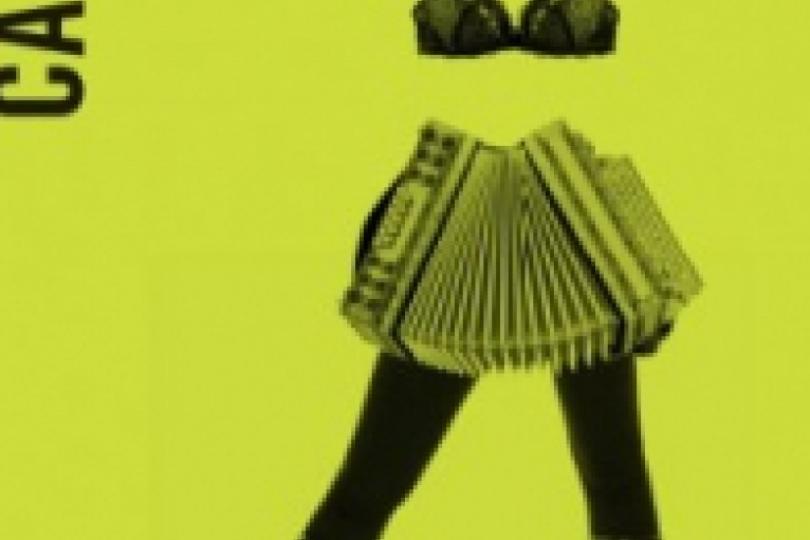REVIEW: 'Cabaret' from Theatre Latte Da & The Hennepin Trust, at The Pantages
Review

I feel an odd kind of possessiveness when it comes to Cabaret. When I first saw the Liza Minelli/Bob Fosse film I was far too young to process everything that was going on—but it still seemed to me an amazing window not simply onto the adult world, but specifically an adult world I understood somehow and wanted to be part of. A world in blatant opposition to the adults actually surrounding me at the time, working and lower-class Italian-Americans in a part of South Brooklyn that, even today, remains a bastion of, uhm, socially challenged individuals.
By the time I was sitting at Studio 54 watching Alan Cumming and Natasha Richardson in the Rob Marshall/Sam Mendes revival, I was living in Hell’s Kitchen, on 44th Street between 9th and 10th (we had a backyard!), with a ballerina whose insane father would soon shatter our will to live, whose ex-boyfriend—a faux Spaniard and quite accomplished flamenco dancer—was a close friend of mine and an integral part of our shared life, and whose circle consisted of musicians, dancers, and musical-theatre actors who enjoyed nothing better than sitting on the floor of our apartment drinking, playing instruments, telling stories and eating pasta straight out of the pot until the sun came up. Nine out of ten nights all that drinking and talking led to literal fights—screaming, shouting, something fragile thrown across the room—but then, Cabaret makes no promises about adult life other than it will be complicated, tragic, and beautiful. And this—rather than its lurid evocations of Weimar Berlin–is the secret behind the show’s staying power.
I saw the Mendes revival a second time, and two other Cabarets after that—I went to Peter Rothstein’s glitzy, gorgeous production last Saturday night with a mélange of Emcees, Sallys, Cliffs and Fraulein Schneiders competing with each other in my mem-ory. But Rothstein’s production is so near to perfect only the most diehard of Cabaret junkies will see it as anything but flawless. I’ve been to several touring shows in the years since moving here from New York and I’ve seen many musicals—but nothing has reminded me more of the shows I jumped on the N Train to see throughout high school than this iteration of Cabaret.
My first Peter Rothstein show was 2007’s La Boheme. Like Cabaret it looked and sounded beautiful, with a talented and versatile orchestra under Denise Prosek’s musical direction (Ms. Prosek got a long-deserved chance to step into the spotlight last year when she was awarded a McKnight Theatre Artist Fellowship). This is an artistry unashamed of itself, of the level of its craft, the polish of its professionalism. Cabaret continues the evolution of this aesthetic, with Marcus Dilliard’s exquisite lighting and the German expressionist-flavored set by Kate Sutton-Jones. Having seen five productions of the show in little over a decade, I can say there are certain traffic problems inherent in the material that Mr. Rothstein and Ms. Sutton-Jones cannot defeat, most pointedly the rhythmic transition between the glorious numbers at the cabaret within Cabaret, and—whoops—time to roll out the furniture again—don’t forget that desk!—and we’re back in Clifford’s homely little room. Aside from these unavoidable hiccups, the production has an appropriate swagger to its own sense of showmanship—the missteps are few and far between.
The performances are equally accomplished, though I found myself wondering a little at the casting. Tyler Michaels is unmistakably a powerhouse talent, but his youth cast a strangely healthy glow over the Emcee. I have no idea the numerical age of any past Emcees, and I’m not comparing actors here. But there’s a knowing glint in this charac-ter’s eye—the sense that he has a secret agenda, or, at the very least, secrets, that was missing, especially in the scenes where he’s required to hover around the edges and watch. I almost felt Mr. Michaels was too conscious of stealing focus, since he didn’t hesitate to make good use of those moments clearly given to him. But this is a role for shameless focus hogs. Also, as small as it sounds, either grab the audience-volunteer’s ass or don’t—a half-grab undermines the entire character.
Similarly, Kira Lace Hawkins has a powerful stage presence and an incredible instru-ment, but she was a strangely competent Sally Bowles. Even her emotional collapse toward the end seemed remarkably healthy—after all, by the end of the piece, she has a lot of things to cry about. I never sensed the constant high-wire bravado of this character, of the type (archetype?) Isherwood captured so well, the young actor/singer/performer in a big, big city, forcing him or herself to be brave in the face of impossible odds and very little money. Moving from the outer boroughs to NYC in my bare twenties I met many Sallys, male and female—perhaps I was one myself. Ms. Hawkins seemed to solve her problems the way any reasonable adult would—by looking for solutions. But she never seemed just one or two inches from drowning.
It’s important to restate how amazing both these performers were and how much I en-joyed their work. But there’s a sense that these characters exist independently of any performer and so comparisons become unavoidable. I found myself more than usually drawn to the story of Fraulein Schneider and Herr Schultz (portrayed by Sally Wingert and James Michael Detmar with the appropriate mix of weariness and charm), in spite of Mr. Rothestein’s tweak on the act break which seemed to put the future of Sally and Cliff’s relationship center stage. In the event it almost turns Act Two into “The Story of Schneider and Schultz.” Again, this was perfectly enjoyable, but a little off balance.
The rest of the company expertly handles the swaggering showmanship of the evening, especially the best of Michael Matthew Ferrell’s dances, “Mein Herr,” the Entre Acte, and “Money.” And they come together for a reprise of “Tomorrow Belongs to Me” so unsettling nobody applauded. Not even one or two lonely claps. I don’t think we feared egging on the Nazis, and I hesitate to make spurious comparisons, but it almost felt like we had become a little too familiar with our friends and neighbors suddenly sounding like political lunatics to applaud even a fictional reminder.
Which brings me back to my initial remark about the staying power of Cabaret—it shows an adult world that seems remarkably complete, especially for a musical. Money, politics, sexuality, old age—it’s obviously not just for those of us who actually packed up our typewriters and moved to the big, big, city. Underneath the girls in their underwear and the boys kissing (scandalous!) the real power of Cabaret reveals itself at the end, with Clifford on his way home, and the wistful longing of his “Willkommen” as he reflects on the sheer variety of experience—good, bad, wonderful, and awful—he’s had in Berlin. This is a mosaic of adulthood we all recognize, even if we never moved more than a mile from home. It’s such a familiar and melancholy note, I’ve never felt we needed the Mendes/Marshall blatant historical kicker. Mr. Rothstein offers his own gloss on this idea, one of very few glitches in an evening of musical theatre not to be missed.




